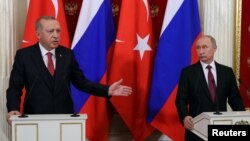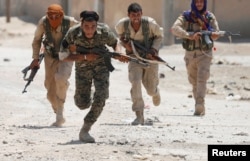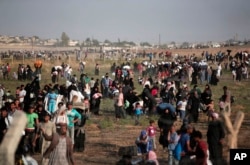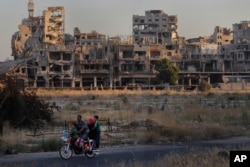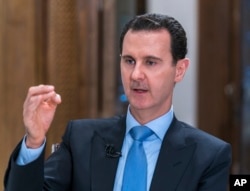Turkish President Recep Tayyip Erdogan met with his Russian counterpart Vladimir Putin on Wednesday in his latest effort to build support for a Turkish-controlled military security zone in Syria.
"The U.S. has already expressed a positive stance. Neither do we have problems [concerning the safe zone] with Russia," said Erdogan at a joint press conference in Moscow.
Erdogan is proposing a 250-kilometer-long and 32-kilometer-deep zone in northeast Syria to protect the Turkish border from the Syrian YPG Kurdish militia. Ankara accuses the YPG of links to Kurdish insurgency inside Turkey.
However, the Turkish president envisages the zone not only providing security, but also an opportunity to ease Turkey's refugee burden and growing economic difficulties.
At the Moscow press conference, Erdogan said the safe zone will allow Syrian refugees in Turkey to return.
The Turkish president said around 300,000 Syrians out of the 4 million that have sought refuge in Turkey have returned to two other regions in Syria captured from the YPG by Turkish forces in the past year.
"There is a huge amount of discontent in Turkey about Syrians," said political analyst Atilla Yesilada of Global Source Partners. "The average, poor AKP [Erdogan's party] voter, they see Syrian refugees as a competitor for limited public resources. It's a huge problem for Erdogan."
Ankara claims the cost of hosting Syrian refugees is over $30 billion.
The deteriorating economic situation exacerbates the Turkish public's discontent over the refugees. Many economists predict Turkey will go into recession this year. Recent opinion polls indicate Erdogan's AKP party's commanding lead over its rivals is rapidly eroding, just ahead of critical local elections in March.
Housing projects
With a possible eye to kick-starting the economy, Erdogan earlier this month unveiled plans for major housing projects for returning Syrians in the proposed buffer zone in Syria.
"My plan would be to build two-story houses with gardens of 500-square meters so the inhabitants could begin a new life," Erdogan said, adding that a buffer zone "would also block migration completely."
Former senior Turkish diplomat Aydin Selcen believes Ankara is looking to the EU to fund the construction project.
"For reconstruction of Syria, it will not be the U.S. because the U.S. say they will not take part in the construction as long as Assad stays," Selcen said.
"The EU seems to be quite willing to play that role because they fear a new influx of refugees emanating from Syria. And Erdogan saw that clearly when dealing with the EU," he added.
Turkey's construction industry has been among the hardest hit by the country's economic slowdown.
"More or less, the private construction industry is coming to a complete standstill," Yesilada said. "It accounts for 10 percent of the GDP. In terms of employment, it's hugely important, as it's a labor-intensive industry. The entire construction industry is one of the pillars of economic growth."
A senior economist for an international bank, speaking anonymously, claims Turkey's construction sector could be in doldrums for a decade, due to the sector's heavy debts and excessive unsold inventories.
Economic boost
International relations professor Huseyin Bagci of Ankara's Middle East Technical University said projects in Syria may well be able to boost Turkey's beleaguered construction industry.
"There is no doubt Syria has to be rebuilt, and the Turkish contribution is going to be immense," Bagci said. "We have been doing this in the good old times of 2008, 9, and 10. Turkey was building [in Syria] hotels, streets, train stations, many things. Why not start again? Reconciliation with Syria in economic terms would be perfect for Turkey."
Bagci said, however, that any major reconstruction projects would require Ankara's reopen diplomatic relations with Damascus. Erdogan steadfastly refuses to normalize ties until Syrian President Bashar al-Assad relinquishes power.
Analysts suggest Europe would also likely balk at providing significant financial support for projects in Turkey's proposed safe zone without the Syrian intervention receiving international validation from the United Nations.
Syrian projects may not be enough to boost Turkey's construction sector very much.
"It's feasible TOKI [Turkish State constructor] can build satellite cities in Syria," Yesilada said, "but turkey is a country where 600,000 new units are sold annually. In Syria, you are going to get a tenth of that a year. So, it's going to help, but it's not a lifesaver."
Selcen also questions the number of Syrians who are ready to return.
"There are not significant numbers of Syrians returning," he said. "The Syrians that are 3 million or so in Turkey. They are here to stay for the foreseeable future. And if you were in their shoes, would you want to leave a place like Istanbul for a destroyed country like Syria?"




